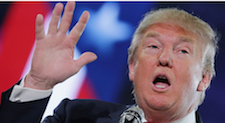President Trump’s worsening political entanglements underscore not only the uncharted territory in which the country now finds itself, but the extreme lengths to which his thinning legion of supporters are willing to travel in order to justify the leader they’ve chosen.
 |
By any reasonable metric, Trump has had a bad month. The FBI in March confirmed that it had opened a counterintelligence investigation to determine whether Trump’s cabinet colluded with Russia in an attempt to throw the 2016 U.S. Presidential election. Then, disgraced former national security adviser Michael Flynn allegedly said he’d testify to Congressional intelligence committees on that collusion in exchange for prosecutorial immunity. And just before the month closed, the New York Times issued a bombshell report that House Intelligence Committee chairman Devin Nunes (who leads the House committee’s investigation into Russia’s alleged tampering) was fed information by White House staff to substantiate Trump’s conspiratorial March claims that Obama had wiretapped him, allegations that have now been debunked by the FBI and NSA, as well as both the House and Senate intelligence committees.
If Trump has a problem with facts, it’s only fitting that it’s a quality he shares with his supporters. It’s fascinating to watch his hardline followers double down at this juncture, denying through clenched teeth that anything is afoot here, refusing to acknowledge what any sane, rational person would recognize as a case of a President facing crisis.
It doesn’t help their confirmation biases that there remain scores of Trump apologists in the media who are willing to take impressive and concerning measures to toe this line, peddling absurd conspiracy theories in a bid to justify Trump’s lies, no matter how constricting the logical entanglements.
When Evelyn Farkas, a former Obama administration Deputy Assistant Secretary of Defense for Russia and Ukraine, spoke during a March MSNBC interview regarding the administration’s efforts in its final days to gather intelligence on Russia’s possible election meddling, fringe blogs and media sites interpreted her claims as a tacit confirmation of Obama’s surveillance of Trump.
|
|
Fox’s Sean Hannity, who has referred to Trump’s alleged ties with Russia as “liberal fake news,” in March falsely claimed on his radio show that Farkas admitted Obama had wiretapped Trump, and thus, “what Donald Trump tweeted out was correct.” Gateway Pundit’s Christina Laila similarly wrote on March 28 that there was a “massive amount of evidence piling up that the Trump camp was spied on by the Obama administration.” Perhaps most famously, Fox News Senior Judicial Analyst Andrew Napolitano lifted a specious claim from a conspiracy website that Obama had asked British spying agency GCHQ to illegally wiretap Trump Tower during the 2016 election.
Fox later benched Napolitano for making these baseless statements, but not before they were repeated by White House Press Secretary Sean Spicer during a March press briefing, which resulted in the U.S. government issuing a formal apology to the U.K.
Spicer, who’s in the unenviable position of being forced to mediate Trump’s falsehoods daily, approaches his briefings like a man going into combat. When he’s not talking in circles or misdirecting questions, the former Republican National Committee communications director has a habit of dressing down reporters, often telling them what angles their stories should take. Spicer should learn that defending the Commander in Chief is just one part of the job; crystalizing the Administration’s policy into honest, forthcoming and substantive messages is another.
There seems to be no threshold to this political Stockholm Syndrome, no ceiling at which point Trump’s supporters will concede, at the very least, to what are obvious flaws in his leadership capabilities. His meteoric rise during the 2016 election may have subverted every expectation, but just ten weeks in, his performance as President has been an abject failure. His signature promise to replace Obamacare was rebuffed by members of his own party. His executive attempts to temporarily bar travelers from majority-Muslim countries were blocked by the courts. The “swamp” of Washington under his tutelage resembles a luxury spa, with massive infrastructure spending proposals that run contrary to every classic Republican tenet. Polling authorities reveal that as few as 38 percent currently approve of the job he’s doing, which means he’s less popular than Bush during the Iraq war and Obama at any point during his two terms (even right-leaning Rasmussen in late March showed Trump with an approval rating of only 44 percent).
Still, Trump’s remaining supporters live in this confabulatory reality where behaviors that run contrary to their own values — lying, authoritarian rule, colluding with Russia to swing U.S. elections, and using a fog machine of tweets to deflect our attention — are now seen as acts of political cunning simply because Trump is the one doing them.
It’s a new level of cognitive dissonance, exhibited by people who ironically purchased firearms during the last administration out of fear of authoritarian “tyranny,” folks who now sincerely believe that the coal industry can be returned to America. These are desperate dreams that accompany the delirious, ameliorative warmth of fooling oneself. Denial, it turns out, isn’t unlike a drug, but it too has effects that will last for only so long.



 The ridiculously high prices Americans are paying at the supermarket might influence how—or if—they vote in November.
The ridiculously high prices Americans are paying at the supermarket might influence how—or if—they vote in November. At a moment in history when there are so many conflicts among peoples here and abroad, let us put our differences aside and celebrate this wonderful season in a spirit of togetherness.
At a moment in history when there are so many conflicts among peoples here and abroad, let us put our differences aside and celebrate this wonderful season in a spirit of togetherness. The news announcing the death of Henry Kissinger, the last of the prevaricating politicians and so-called statesmen who stole my future and that of thousands of other young Americans, got me thinking about Walter Cronkite.
The news announcing the death of Henry Kissinger, the last of the prevaricating politicians and so-called statesmen who stole my future and that of thousands of other young Americans, got me thinking about Walter Cronkite.


 Have a comment? Send it to
Have a comment? Send it to 
No comments have been submitted for this story yet.